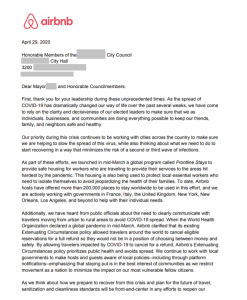
Airbnb’s Chris Lehane, vice president of global policy and communications, is reaching out to city officials to influence COVID-19-related reopening policies to “work together to restore safety and rebuild our local economies in the smartest, most sustainable, and healthy way possible.”
In a letter obtained by VRM Intel to municipal officials on April 29, Airbnb’s Lehane suggests that the company is currently and actively working with governments to address pandemic-related issues, stating, “Our priority during this crisis continues to be working with cities across the country to make sure we are helping to slow the spread of this virus, while also thinking about what we need to do to start recovering in a way that minimizes the risk of a second or third wave of infections.”
Airbnb’s letter seeks to influence short-term rental regulations during “transitional travel reopening plans.”
In a recent address to its host community, CEO Brian Chesky said, “Government officials and policy makers are also focused on our cleaning practices, and we anticipate more regulation,” so this initiative comes with little surprise. However, Lehane’s letter provides more insight into how Airbnb intends to use this crisis in discussions with policymakers. Here are key points from Airbnb’s letter to governments, municipal officials, and city managers:
1. REFUND POLICY
“When the World Health Organization declared a global pandemic in mid-March, Airbnb clarified that its existing Extenuating Circumstances policy allowed travelers around the world to cancel eligible reservations for a full refund so they would not be in a position of choosing between money and safety. By allowing travelers impacted by COVID-19 to cancel for a refund, Airbnb’s Extenuating Circumstances policy prioritizes public health and avoids spread. We continue to work with local governments to make hosts and guests aware of local policies- including through platform notifications–emphasizing that staying put is in the best interest of communities as we restrict movement as a nation to minimize the impact on our most vulnerable fellow citizens.”
2. ANNOUNCEMENT OF ENHANCED CLEANING INITIATIVE (ECI)
“Today we are announcing our Enhanced Cleaning Initiative, which will launch on the Airbnb website in early May and designates a specific category of spaces listed on Airbnb that meet rigorous cleanliness standards and protocols, as advised by these experts.”
3. CALL TO ACTION: AIRBNB ASKS CITY OFFICIALS TO INTEGRATE ITS ECI INTO THEIR “TRANSITIONAL TRAVEL REOPENING PLANS”
“As part of this launch, we hope to continue collaborating with governments on health and risk mitigation, including working together to integrate Enhanced Cleaning Initiative standards and inventory into transitional travel reopening plans.”
“. . . The Cleaning Protocol will also include specific information on COVID-19 prevention, like a wait period before entering, use of personal protective equipment, like masks and gloves, as well as disinfectants and sanitizers that are approved by regulatory authorities.”
4. PROMOTION TO CITY OFFICIALS OF A 72-HOUR “WAITING” OR “BUFFER” PERIOD AS PART OF PLAN
“. . . hosts will be able to opt into a new feature called Booking Buffer, to create a vacancy period between stays. Through an easy tool on the platform, hosts can commit to keeping their home empty for a set period in between stays, with no activity other than cleaning. Reservations will be automatically blocked during that time frame, currently set at 72 hours.”
REGULATORY INFLUENCE
Lehane’s letter demonstrates that Airbnb is proactively reaching out to government officials and city managers to:
- Boast that Airbnb fully refunded travelers;
- Persuade officials to include Airbnb’s new Enhanced Cleaning protocols into government transitional travel reopening plans; and
- Promote a 72-hour buffer/waiting period between stays as a regulatory solution.
Airbnb’s strategy of influencing government policy to promote its agenda is not new. One of the company’s primary hurdles on its road to an IPO was getting its listings legalized in municipalities. To meet this objective, Airbnb caused significant industry disruption in many vacation rental communities by pushing for legalization in homes/apartments in which the primary resident is present while promoting a ban and/or 30-day rental restrictions for traditional second-home/whole-home vacation rentals.
However, both travelers and city officials are learning that Airbnb is a only a website that lists short-term rentals. Airbnb does not own vacation rentals, does not manage these rentals, does not clean these rentals, and does not service these rentals. It is more like a Craigslist with a great brand image and a payment processor.
Although the policies Airbnb is promoting to governments are designed to promote Airbnb as a friend to the city, these policies are being offered on the backs of its rental providers. For example, Airbnb refunded hosts’ money with no notice and by overriding their existing cancellation policies.
And the 72-hour “buffer” time?
Currently, there is no evidence that a 72-hour waiting period (or even a 24-hour period) between bookings provides additional safety for guests; and at this time, Airbnb does not have a way to enforce this policy. Many of its listings’ booking calendars are fed to Airbnb via connections with external software systems, and Airbnb has no control over these. Its only recourse is to 1) penalize noncompliant listings with a lower rank in search on the site, or 2) prohibit noncompliant rentals from listing on the site.
Related: How 72-hour waiting periods between stays affect revenue for hosts
View Original Post on VRMIntel.com











RSS